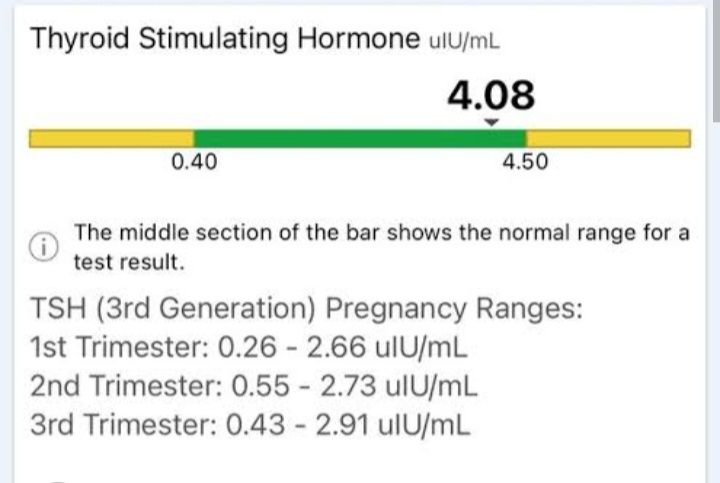The thyroid is a small, butterfly-shaped gland in the front of your neck. Your thyroid makes hormones that control how your body uses energy. Thyroid hormones affect nearly every organ in your body, including your heart. They help control your weight, body temperature, muscle strength, and even your mood. If you don't have enough thyroid hormones in your blood, many of your body functions slow down. If you have too much, many body functions speed up.
Your thyroid is controlled by a gland in your brain, called the pituitary gland. The pituitary gland makes thyroid stimulating hormone (TSH). TSH tells your thyroid how much thyroid hormone it needs to make.
If the thyroid hormone levels in your blood are too low, your pituitary gland makes larger amounts of TSH to tell your thyroid to work harder. If your thyroid hormone levels are too high, the pituitary gland makes little or no TSH. By measuring TSH levels in your blood, you can find out if your thyroid is making the right level of hormones
What is it used for?
A TSH test is used to find out how well your thyroid is working. It can tell if you have hyperthyroidism (too much thyroid hormone) or hypothyroidism (too little thyroid hormone) in your blood. But a TSH test can't show what is causing a thyroid problem.
If you take prescription thyroid hormone medicine because of hypothyroidism or because you had your thyroid removed, you'll have regular TSH tests to check your thyroid hormone levels. TSH tests are also used to monitor your thyroid hormone levels after treatment for hyperthyroidism.
Why do I need a TSH test?
You may need a TSH test if you have symptoms of too much or too little thyroid hormone in your blood.
Hyperthyroidism (too much thyroid hormone) is also called overactive thyroid. Having more thyroid hormones than you need speeds up your body functions and causes symptoms that include:
• Weight loss, even though you may be eating more than usual
• Rapid or irregular heartbeat
• Feeling nervous or irritable
• Trouble sleeping, fatigue
• Shaky hands, muscle weakness
• Sweating or being very sensitive to heat
• Frequent bowel movements (pooping a lot)
• Goiter (enlarged thyroid)
Hypothyroidism (too little thyroid hormone) is also called underactive thyroid. Not having enough thyroid hormone slows down your body functions and causes symptoms that include:
• Fatigue
• Weight gain
• Being very sensitive to cold
• Joint and muscle pain
• Dry skin
• Dry, thinning hair
• Heavy or irregular menstrual periods
• Depression
• Constipation
You may also have a TSH test, along with other tests, to help diagnose unusual bumps or lumps on your thyroid that may be thyroid cancer or thyroid nodules (growths on your thyroid that aren't cancer).
What do the results mean?
Your TSH test results can tell you if your thyroid is making too much or too little thyroid. But the test can't explain why your TSH levels may be too high or too low.
If your test results aren't normal, your provider will probably order other thyroid blood tests to find out what's causing your thyroid problem. These blood tests may include:
• T4 thyroid hormone test
• T3 thyroid hormone test
• Thyroid antibodies test to help diagnose an autoimmune thyroid disorder, such as:
• Graves' disease, the most common cause of hyperthyroidism
• Hashimoto's disease, that the most common cause of hypothyroidism
In certain cases, an abnormal TSH result may be a sign of a pituitary gland problem, but this doesn't happen often
Is there anything else I need to know about a TSH test?
TSH levels may be high or low even when your thyroid gland is healthy. Serious illnesses not related to your thyroid may cause lower TSH levels for a short time. And TSH levels may be higher in people over age 80, even though they don't have any thyroid problems.
Pregnancy also affects TSH levels. They are often a little low during the first three months. But sometimes, thyroid disease develops during pregnancy. If you develop thyroid disease during pregnancy, your provider will monitor your condition through your pregnancy and after your baby is born. That's because hyperthyroidism, and less often, hypothyroidism, can continue after you give birth. If you have a history of thyroid disease, be sure to talk with your provider if you are pregnant or are thinking of becoming pregnant.
Newborn babies are routinely screened with a TSH test to see if they were born with hypothyroidism (congenital hypothyroidism).


No comments:
Post a Comment